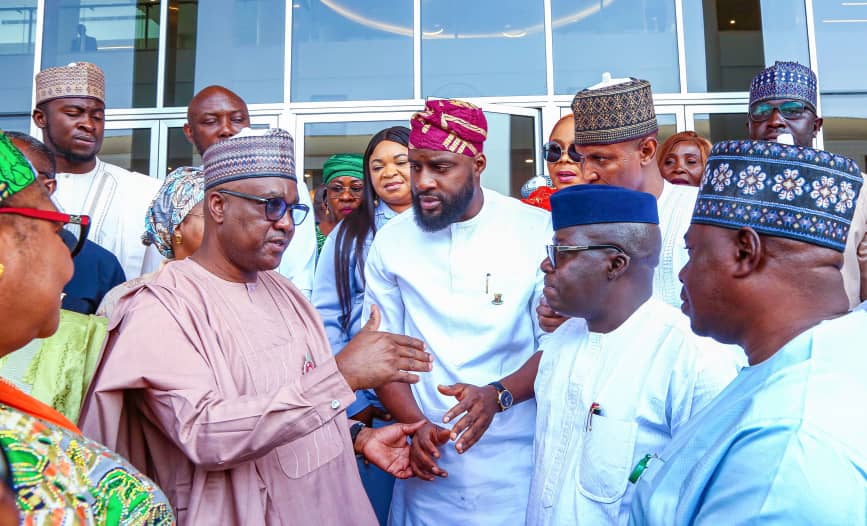News
Affirmative action for women, a necessary corrective measure – Speaker Abbas

…as Reps meet state speakers on gender-based violence, constitution amendment bills
The Speaker of the House of Representatives, Hon. Abbas Tajudeen, has stated that affirmative action for women is not a privilege and undemocratic, but a corrective measure that must be taken to ensure fairness and gender balance in the polity.
The Speaker said it has become necessary to mainstream women’s and gender issues in the constitution, statutes, policies, and budgetary processes of Nigeria.
The Speaker made this known in his keynote address at a session with Speakers of State Houses of Assembly to Commemorate the Conclusion of the 16 Days of Activism Against Gender-Based Violence (GBV) held at the National Assembly on Monday.
Speaker Abbas noted that the session was to commemorate the conclusion of the 16 Days of Activism Against Gender-Based Violence (GBV), a campaign that began on November 25, with the People’s House taking a prominent role. He recalled how he led an advocacy walk from the National Assembly to the Force Headquarters to submit a petition to the Inspector General of Police.
“This action signified our resolve to combat violence against Nigerian women and to reinforce our collective commitment to creating a safer and more equitable society,” he added.
The Speaker noted that the 16 days had served as a rallying point, uniting diverse stakeholders in a shared mission to protect and empower women and girls across Nigeria.
He also noted that the National Assembly has long been at the forefront of the fight against GBV and the advocacy for greater women’s representation.
He said since 1999, the parliament has championed transformative legislative reforms, including the enactment of the Violence Against Persons (Prohibition) Act; the Child’s Rights Act, and the Trafficking in Persons (Prohibition) Enforcement and Administration Act.
The Speaker further noted that the 10th House has amplified these efforts through its Legislative Agenda, which prioritises constitutional reforms to promote women’s political participation and representation.
Speaker Abbas said the agenda reflects the parliament’s recognition of the indispensable role women play in governance and the broader societal fabric.
“Women are the cornerstone of our families and communities, yet their political representation remains unacceptably low. This imbalance must change—not for improved statistics but for the transformative value women bring to governance, leadership, and policymaking,” he said.
While emphasising that the importance of eradicating GBV and promoting women’s representation cannot be overstated, he stated that a society that protects its women and leverages their potential is one that secures its future.
“Women are the glue that holds our families and communities together. Despite this, systemic barriers, including cultural norms, economic inequality, and inadequate legal protections, have hindered their full participation in political and public life,” he said.
The Speaker pointed out that the 10th Assembly has taken proactive steps to address these barriers.
“Recognising past pitfalls, we have commenced the constitutional amendment process early to allow for extensive consultation and consensus-building,” he said, stressing that the House Committee on Constitution Amendment has embarked on robust sensitisation and advocacy efforts, engaging stakeholders to build support for provisions that will constitutionalise greater women’s representation.
Speaker Abbas stated: “These efforts go beyond tokenism. Affirmative action for women is not undemocratic; it is a necessary corrective measure to address historical inequities and unlock our nation’s full potential. Many African countries, such as Rwanda and South Africa, have successfully enshrined affirmative action in their constitutions.”
The Speaker said state Houses of Assembly are pivotal to achieving meaningful constitutional reforms, adding that the active participation and support of state speakers are crucial in ensuring that gender-focused amendments and legislation are adopted at the sub-national level.
News
Reps Tackle CBN, OAGF Over Missing Grants, Bailout Funds

According to him, such financial mishandling not only disrupts critical public services and projects but also results in major losses to the nation’s purse—resources that could have been channelled into crucial services and developmental efforts, as laid out in Section 14(2)(b) of the Constitution.
Speaker Abbas, thereafter setup a Special Committee to be chaired by Rep. Chinedu Martins to immediately launch a probe into the “Utilisation of take-off grants, bailout funds, and interventions allocated to MDAs, government institutions, and GOEs from 2015 to present.”
News
Abuja light rail project must be commissioned on May 29-Wike vows

The FCT Minister, Mr. Nyesom Wike, expressed satisfaction with the progress on the Abuja light rail project, reaffirming its May 29 delivery as sacrosanct.
He made these assurances after inspecting the ongoing construction of access roads to the train stations on Wednesday, from Metro Train Station in the Central Area to Nnamdi Azikiwe International Airport, Abuja.
Reassuring journalists accompanying him, the minister reiterated that President Bola Tinubu would commission the rail project on May 29 to mark his second year in office.
The visited stations were Wupa station near Idu and Bassanjiwa station near the airport.
“This is part of our routine inspection of ongoing projects to see the contractors’ progress,” Wike explained.
“We are working day and night to fulfill our promise to President Tinubu and FCT residents. By May, Mr. President will ride on the Metro line.”
News
Just in: Alleged Herdsmen Armed With AK-47 Rifles Take Over Communities In Benue State

Gunmen suspected to be Fulani herdsmen are currently invading some communities in the Ukum Local Government Area of Benue State.
According to sources, the herdsmen armed with AK-47 rifles stormed the community around 04:15pm on Thursday.
“Our lives are in danger this evening, armed Fulani herdsmen, about 600 in numbers have taken over our communities this evening,” a resident told SaharaReporters.
“They’re currently moving around towns in Ukum Local Government Area of Benue state. No security personnel at all, Governor Alia didn’t send security, they said operation will start soon once they (herders) have observed the place.”
The insecurity situation in Benue has been alarming in recent weeks with attacks from gunmen suspected to be herdsmen.
The media had reported that suspected herdsmen again unleashed terror in Benue State, attacking three communities in Otukpo Local Government Area (LGA) on Wednesday, just a day after 11 people were killed in a deadly raid on Otobi community.
The latest victims of the escalating violence were Emichi, Odudaje, and Okpamaju, communities that had previously suffered an attack in February, which left five people dead.
However, the renewed attack has created fear and mass displacement among residents, with women and children fleeing to safety.
Local sources say the death toll from the fresh attack remains unclear, but several casualties are feared.
-

 News14 hours ago
News14 hours agoBREAKING: Unknown gunmen reportedly storm Senator Natasha’s family residence
-

 News17 hours ago
News17 hours agoSnub story on removal of Rivers Sole Administrator, it’s FAKE-Chief Registrar
-

 News23 hours ago
News23 hours ago“How my father escaped assassination” – Bishop Oyedepo’s daughter
-

 News23 hours ago
News23 hours agoFG expresses sympathy for CBEX victims, urges a united effort to combat Ponzi schemes
-

 News16 hours ago
News16 hours agoSAD! Again, Alleged Herdsmen Attack Three Benue Communities
-

 News8 hours ago
News8 hours agoAbuja light rail project must be commissioned on May 29-Wike vows
-

 Politics16 hours ago
Politics16 hours agoPDP govs are jokers, can’t stop coalition train, Atiku boasts
-

 News14 hours ago
News14 hours agoLawmaker Slams NBA Over Rivers Crisis, Demands Return of N300m

















